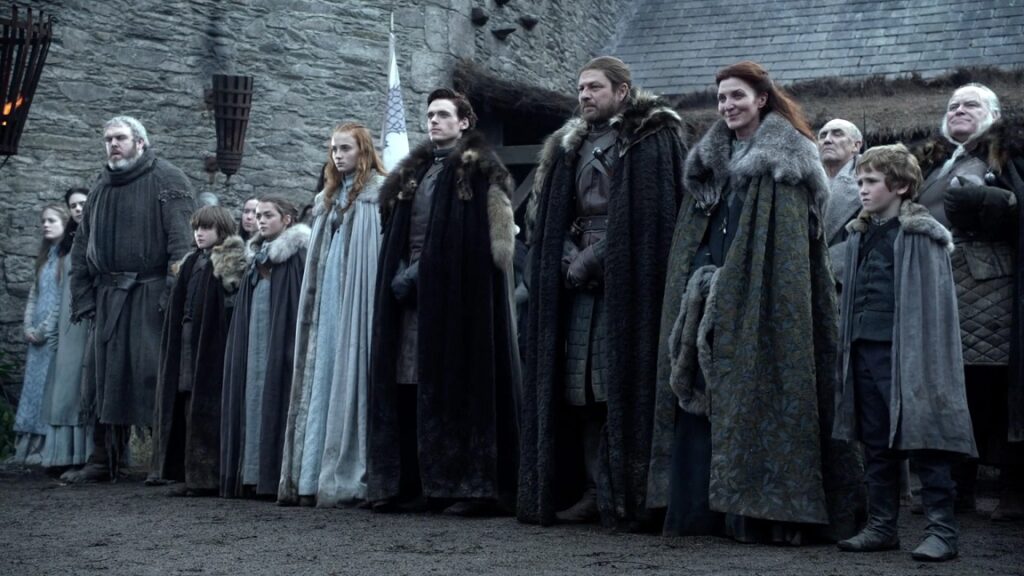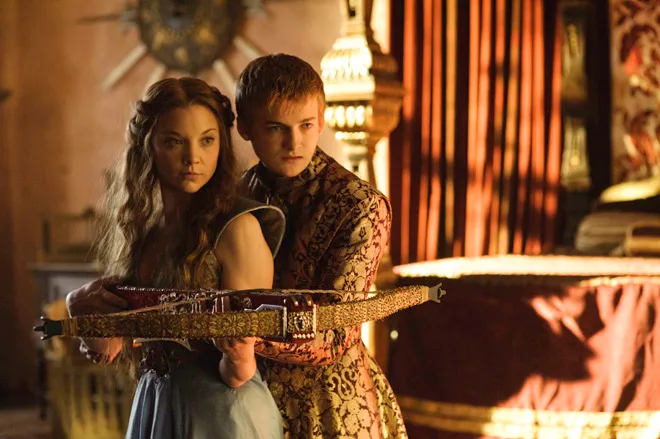
When Does Game of Thrones Get Good?
Fans of Game of Thrones argue that Game of Thrones has a strong first few episodes, but captures most viewers by about the time the first season ends. At that point, the show continues strong through the first several seasons with very few lulls in quality. That being said, most fans feel strongly that the final seasons are troublingly poor quality. Fans argue new viewers should complete the series at that point, but many were taken by surprise by how fast the quality of the show fell off leading into the final seasons.
What Fans Say:
Fans of Game of Thrones often cite the show’s unpredictability, depth of storytelling, and character development as reasons for its success. Many viewers were drawn to the morally complex characters, from honorable Ned Stark to cunning Tyrion Lannister, and enjoyed the way the show subverted traditional fantasy tropes by killing off main characters. Fans were also impressed by the show’s cinematic quality, with battle scenes like the “Battle of the Bastards” earning accolades for their scale and choreography. The strong ensemble cast, including performances by Emilia Clarke, Peter Dinklage, and Kit Harington, also received praise. For many fans, the show’s early seasons created an emotional connection that kept them invested throughout.
What Haters Say:
Critics of the show, especially in its later seasons, argue that the plot became increasingly rushed and less cohesive. Some felt that the show’s deviation from George R.R. Martin’s source material led to plot inconsistencies and unsatisfying conclusions for major characters. The final season, in particular, faced criticism for abrupt shifts in characters’ behavior, rapid pacing, and resolutions that many felt undermined earlier narrative build-up. Additionally, some fans disliked how the ending handled the story arcs of pivotal characters, feeling that it abandoned the moral complexity and realism that had defined earlier seasons.
Does the Show Fall Off in Quality at Any Point?
Many fans and critics agree that the show’s quality begins to wane around Season 7, with the pacing and narrative depth suffering as the show diverges from Martin’s books. The showrunners condensed a story that previously took its time into fewer episodes, leading to a feeling of rushed storytelling in Seasons 7 and 8. Some of the key character decisions and plot points, particularly Daenerys Targaryen’s rapid transformation in the final episodes, were controversial. Despite these criticisms, some fans appreciate the final seasons for their high-stakes drama and intense action sequences, even if they felt the writing wasn’t up to the same standard as earlier seasons.
Game of Thrones Overview:
Game of Thrones, an adaptation of George R.R. Martin’s A Song of Ice and Fire novels, quickly became one of the most talked-about television shows worldwide. Created by David Benioff and D.B. Weiss and aired on HBO from 2011 to 2019, the series is set in the fictional continents of Westeros and Essos and follows noble families as they vie for control of the Iron Throne and the power to rule the Seven Kingdoms. With complex characters, unpredictable plot twists, and a level of production rarely seen in television, Game of Thrones drew millions of viewers and reshaped the fantasy television genre.
The show is well known for its morally gray characters and plotlines that explore themes of power, loyalty, betrayal, and survival. As the series progresses, viewers watch the characters face increasingly dire circumstances, especially as the mysterious and deadly White Walkers encroach from the North. Game of Thrones is especially praised for bringing a gritty realism to fantasy, with consequences for characters’ actions and a world where anyone could die at any time.
Despite its immense popularity, the show’s final season was met with a mixed reception. While the series maintained high-quality production, critics and fans alike voiced concerns over pacing, character decisions, and perceived rushed storytelling in its final episodes. However, Game of Thrones remains a cultural phenomenon, celebrated for its character arcs, high-stakes drama, and groundbreaking special effects.
Aggregated Critic Commentary:
| Season | Rotten Tomatoes Score | IMDb Score |
|---|---|---|
| 1 | 90% | 9.0 |
| 2 | 96% | 9.0 |
| 3 | 96% | 9.0 |
| 4 | 97% | 9.1 |
| 5 | 93% | 8.6 |
| 6 | 94% | 9.0 |
| 7 | 93% | 8.4 |
| 8 | 55% | 6.1 |
Game of Thrones received widespread critical acclaim, especially for its early seasons, which were praised for intelligent plotting, complex characters, and unpredictable twists. Critics have frequently highlighted the show’s success in balancing multiple storylines across diverse locations, a feat that elevated its narrative complexity. Game of Thrones has also been commended for raising the bar for television production quality, with its ambitious battle scenes, intricate costume designs, and lavish sets creating an immersive world.
Despite the acclaim, Game of Thrones’s later seasons saw a shift in critical reception. While many critics still praised its visuals and emotional moments, they expressed disappointment with the rushed pacing and character arcs in the final season. Nevertheless, the show remains highly regarded for its early achievements, leaving a lasting legacy in television history and inspiring countless subsequent series in the fantasy genre.
Season Highlights:
Season 1: The first season of Game of Thrones introduces viewers to the complex world of Westeros, where political intrigue abounds. Key characters like Eddard Stark, Robert Baratheon, Daenerys Targaryen, and Tyrion Lannister are introduced, setting the stage for the struggle for the Iron Throne. The season’s shocking finale, with the execution of Ned Stark, upends expectations and establishes the show’s reputation for high-stakes drama.
Season 2: Season 2 delves into the War of the Five Kings as various houses vie for control of the throne. Highlights include the Battle of Blackwater, a gripping spectacle that shows Tyrion’s cunning in defending King’s Landing. Meanwhile, Daenerys grows in strength across the Narrow Sea, while Jon Snow ventures into the North, where the threat of the White Walkers looms ever larger.
Season 3: Often cited as one of the best seasons, Season 3 includes key moments like the Red Wedding, which shocked audiences and underscored the show’s unforgiving nature. Jaime Lannister’s character development and budding friendship with Brienne of Tarth are also fan-favorite storylines. Meanwhile, Daenerys builds her army with the Unsullied, marking her growth as a powerful contender for the throne.

Season 4: Season 4 brings more shocking events, including the death of King Joffrey in the infamous Purple Wedding. Tyrion’s trial, Oberyn Martell’s tragic duel with The Mountain, and the intense Battle at Castle Black are some highlights. This season explores themes of justice and vengeance, with powerful moments for characters like Tyrion, Arya, and Sansa.
Season 5: In Season 5, the political intrigue intensifies as Cersei faces the rise of the religious zealot High Sparrow, while Jon Snow takes command at the Wall. Daenerys struggles to maintain control over Meereen, facing growing resistance. Key events include the controversial burning of Shireen Baratheon and the White Walkers’ terrifying attack in the episode “Hardhome.”
Season 6: Season 6 delivers some of the show’s most memorable moments, including the Battle of the Bastards and Cersei’s explosive destruction of the Great Sept of Baelor. Jon Snow is resurrected and declared King in the North, and Daenerys finally sails for Westeros. This season balances fan service with plot development, earning acclaim for its satisfying story progression.
Season 7: Season 7 escalates the conflicts, bringing Daenerys, Jon, and Cersei into direct confrontation. Key moments include the dragon battle beyond the Wall and the alliance between Jon and Daenerys. While fans appreciated the action, some critics noted a decline in storytelling depth and pacing as the show began to wrap up its complex plotlines.
Season 8: The final season divided fans and critics alike. While praised for its production values and emotional stakes, it was criticized for rushed pacing and perceived inconsistencies in character decisions. Daenerys’s sudden turn and the resolution of the White Walker threat were particularly polarizing. Despite mixed reactions, the show’s cultural impact remained undeniable.
Similar Shows
- The Witcher
- Vikings
- The Expanse
- Westworld
- Rome
If You Liked These, You’ll Like “Game of Thrones”:
- The Witcher – Known for its fantasy elements, dark storytelling, and complex characters, it appeals to fans of Game of Thrones’s intricate world.
- Vikings – Shares a similar historical drama and brutal realism with characters vying for power and legacy.
- House of the Dragon – As the official prequel, it explores the Targaryen history with political intrigue and familial conflict.
- The Expanse – While sci-fi, it brings the same intensity and complex, morally ambiguous characters as Game of Thrones.